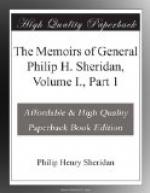In prosperity they mainly subsisted on fish, or game killed with the bow and arrow. When these sources failed they lived on grasshoppers, and at this season the grasshopper was their principal food. In former years salmon were very abundant in the streams of the Sacramento Valley, and every fall they took great quantities of these fish and dried them for winter use, but alluvial mining had of late years defiled the water of the different streams and driven the fish out. On this account the usual supply of salmon was very limited. They got some trout high up on the rivers, above the sluices and rockers of the miners, but this was a precarious source from which to derive food, as their means of taking the trout were very primitive. They had neither hooks nor lines, but depended entirely on a contrivance made from long, slender branches of willow, which grew on the banks of most of the streams. One of these branches would be cut, and after sharpening the butt-end to a point, split a certain distance, and by a wedge the prongs divided sufficiently to admit a fish between. The Indian fisherman would then slyly put the forked end in the water over his intended victim, and with a quick dart firmly wedge him between the prongs. When secured there, the work of landing him took but a moment. When trout were plentiful this primitive mode of taking them was quite successful, and I have often known hundreds of pounds to be caught in this way, but when they were scarce and suspicious the rude method was not rewarded with good results.
The band looking down on us evidently had not had much fish or game to eat for some time, so when they had made Williamson understand that they were suffering for food he permitted them to come into camp, and furnished them with a supply, which they greedily swallowed as fast as it was placed at their service, regardless of possible indigestion. When they had eaten all they could hold, their enjoyment was made complete by the soldiers, who gave them a quantity of strong plug tobacco. This they smoked incessantly, inhaling all the smoke, so that none of the effect should be lost. When we abandoned this camp the next day, the miserable wretches remained in it and collected the offal about the cooks’ fires to feast still more, piecing out the meal, no doubt, with their staple article of food—grasshoppers.
On the morning of August 5 Lieutenant Hood started back to Fort Reading, and Lieutenant Williamson resumed his march for the Columbia River. Our course was up Pit River, by the lower and upper canons, then across to the Klamath Lakes, then east, along their edge to the upper lake. At the middle Klamath Lake, just after crossing Lost River and the Natural Bridge, we met a small party of citizens from Jacksonville, Oregon, looking for hostile Indians who had committed some depredations in their neighborhood. From them we learned that the Rogue River Indians in southern Oregon were on the war-path, and that as the “regular




